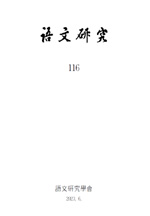- 영문명
- A Study on the Anti-Japanese Diary of Seongam Lee Cheol-yeong
- 발행기관
- 어문연구학회
- 저자명
- 연민희(Min-hee Yeon)
- 간행물 정보
- 『어문연구』第125輯, 207~231쪽, 전체 25쪽
- 주제분류
- 어문학 > 한국어와문학
- 파일형태
- 발행일자
- 2025.09.30

국문 초록
이철영의 문집인 ≪醒菴集≫에는 <己酉日記>(1909), <庚戌日記>(1910), <甲寅日記>(1914), <戊午日記>(1918) 등이 기재되어 있다. 이 4편의 일기는 해당 연대에 발생한 특정 사건을 중심으로 이루어졌으나 동일한 사건에 대한 기록을 긴 기간에 4차례나 나누어 기록했다는 점에서 일반적 일기와는 구별되는 양상을 띠고 있다. 이 일기들은 1909년에서부터 1918년까지 10년의 세월에 걸쳐 기록되었는데, 10년 동안 매일 쓴 것은 아니고 주로 1년에서 3~4년의 격차를 두고 쓰여졌다. 이철영의 일기는 기록 의도가 분명하며, 네 편의 일기가 하나씩 독립된 것이 아니라 일관성 있는 주제 안에서 서술되고 있다는 특징이 있다. 대부분의 일기는 평서형으로 구성된 경우가 많은데 대화체로 일기를 쓴 것은 긴박한 현장감을 살리고 거기서 오는 사실성이 독자를 더 설득시킨다. 이철영은 의도적으로 대화체를 사용하여 현장감을 살리는 데 주력하였다.
이철영 논변의 기본은 ≪맹자≫에서 습득한 것이 대부분이다. 동양의 경전을 바탕으로 한 이해, 변치 않는 지조와 신념 때문에 이철영의 논리는 흔들림이 없고, 이러한 논변에 일본 경찰의 논리는 미약하다. 이로 인해 일경과 이철영이 각자의 논리로 싸우다가 일본이 굴복하고 마침내는 이철영을 인정하는 것이 하나의 과정이 되었다.
이철영은 일기에 한시를 기록함으로써 저항정신을 배가시키는 효과를 이뤄냈다. 이는 일상을 기록하는 일에만 한정하지 않고 詩文의 저작 배경을 최대한 설명한 것은 물론 다른 저술 활동과 긴밀히 연결되어 있다는 점에서 의의가 크다. 그리고 문학 활동에 대한 기록이라는 점에서 일기의 가치를 높이는 데 큰 역할을 하였다.
이와 같이 이철영의 일기는 일제강점기에 의병으로 활약했던 우국지사의 일기라는 점에서 첫 번째 의의가 있고, 하나의 사실에 대해 10년간의 시간을 들여서 그중에 중요한 장면만을 네 개의 일기로 나누어 서술했다는 점에서 특징이 있고, 그 일기의 주제가 바로 민적법에 관한 것이라는 점에서 의의가 있고, 일기 중에 일본 간수를 교화하고 동화했다는 사실을 확인할 수 있다는 점에서 가치가 있다. 그러므로 이철영 일기는 단순히 일상을 기록한다는 차원을 훨씬 뛰어넘어 어느 한 시대의 증언이기도 하며 일제강점기에 항일지사로서 활약했던 선비의 기록이라는 점에서 큰 의의가 있다. 이철영의 네 개의 일기는 이철영이 10년간 지속적으로 일제의 민적법에 대항하여 투쟁한 사실과 그의 저항 논리를 잘 보여준다. 그러므로 이 일기는 일상 기록이 아닌 일제강점기의 증언이기도 하며 우국지사의 불굴의 저항정신을 잘 드러냈다는 점에서 일기문학사적 위상과 의의를 자리매김할 수가 있다.
영문 초록
The collection of works by Seongam Yi Cheol-yeong, the ≪Seongamjip≫, includes diaries such as the (1909), (1910), (1914), and (1918). While these four diaries are centered around specific events that occurred in their respective years, they differ from typical diaries in that they record the same event over a long period, divided into four instances. These diaries were written over a decade from 1909 to 1918, not daily, but with gaps of one to three or four years. Lee Cheol-yeong's diaries have a clear authorial intent, and the four works are not independent but are narrated under a consistent theme. As a historical record of personal history, Lee Cheol-yeong's diary holds value and significance as a report testifying to an era. While most diaries are composed in a descriptive style, the use of a conversational style in his diary brings a sense of urgent realism to the scene, and the resulting factuality deeply moves the reader. Lee Cheol-yeong intentionally used a conversational style to emphasize this sense of presence.
The foundation of Lee Cheol-yeong's arguments is largely derived from his learning of the Mencius. Because of his understanding based on Eastern classics and his unwavering principles and beliefs, Lee Cheol-yeong's logic was unshakable, and the Japanese police's logic could not stand against it. This brought him more victories in debates than simply asserting his own claims. This led to a process where the Japanese police and Lee Cheol-yeong would argue with their respective logics, with Japan eventually conceding and acknowledging Lee Cheol-yeong.
By including Chinese-style poetry (Hanshi) in his diary, Lee Cheol-yeong amplified the spirit of resistance. His act of recording these poems was not limited to documenting daily life; it is significant in that he explained the background of the literary works in as much detail as possible and closely linked them to his other writing activities. This played a major role in enhancing the diary's value as a record of literary activity.
As such, Lee Cheol-yeong's diary is significant, firstly, as the diary of a patriotic righteous person who was active as a righteous army member during the Japanese colonial period. Secondly, it is distinctive in that it narrates a single event over a span of ten years, dividing it into four diaries focusing only on the important scenes. Thirdly, it is meaningful that the theme of the diary is the Civil Registration Law. Fourthly, its value lies in confirming the fact that he educated and assimilated a Japanese guard. Therefore, Lee Cheol-yeong's diary transcends the simple dimension of recording daily life; it is a testimony of an era and contains the purest intentions of a patriotic righteous person and the indomitable resistance stemming from it, thereby elevating its status and significance in the history of classical Korean literature written in Chinese.
목차
1. 序言
2. 저술 배경
3. 수사를 통한 기록 방식
4. 結言
참고문헌
키워드
해당간행물 수록 논문
참고문헌
최근 이용한 논문
교보eBook 첫 방문을 환영 합니다!

신규가입 혜택 지급이 완료 되었습니다.
바로 사용 가능한 교보e캐시 1,000원 (유효기간 7일)
지금 바로 교보eBook의 다양한 콘텐츠를 이용해 보세요!



